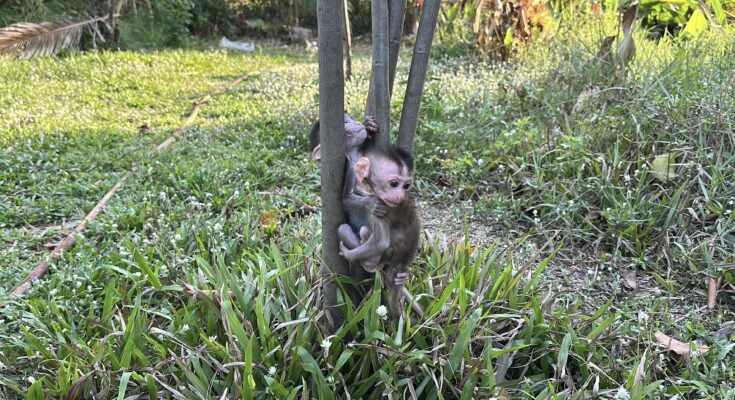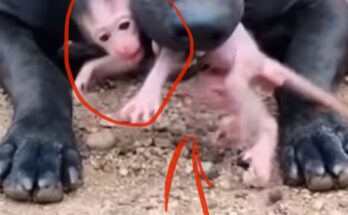In the vast expanse of the jungle, where the trees stretch to the skies and the air is filled with the sounds of nature, a heartbreaking sight can sometimes be witnessed. Imagine a poor little baby monkey, clinging to a tree, utterly alone. Its small body trembles as it searches for comfort and safety, but there is no one around. No mother to cradle it, no family to watch over it—just the lonely, silent presence of the baby monkey, stranded high above the jungle floor.
The tragedy of this baby monkey’s plight is one that can evoke profound sympathy in the hearts of all who witness it. Monkeys, like many other animals, are social creatures. They rely on the protection and guidance of their mothers and the close-knit bond of family members to survive in the wild. In a world where survival is a constant struggle, the absence of such crucial support can lead to vulnerability, loneliness, and, in some cases, a tragic fate.
For a baby monkey, the first few months of life are crucial. During this time, they are dependent on their mothers for nourishment, warmth, and protection from predators. The bond between mother and child is irreplaceable. The mother teaches the baby essential survival skills—how to find food, how to move through the trees, and how to avoid dangers lurking in the jungle. Without this maternal care, the baby is left helpless, unable to fend for itself.
So, what happens to a baby monkey left alone in the wild? The answer isn’t a simple one. The jungle is both a place of beauty and danger. For the baby monkey, life in the wild is a constant battle for survival. The absence of the mother means the baby has no one to guide it, and it may struggle to find food or navigate its environment. It is also at a higher risk of becoming prey to larger predators. In the wild, the fate of an orphaned animal is rarely a hopeful one.
However, not all hope is lost. In some cases, other members of the troop may come to the aid of an orphaned baby monkey. Some species of monkeys, such as capuchins or macaques, are known for their strong social structures. These social groups may adopt an orphaned infant, sharing the responsibility of raising it. It’s not always guaranteed, but there are instances where the baby monkey finds a new surrogate mother or caregiver in the troop. In these cases, the baby may still have a chance at survival and even thrive as part of a new family.
Sadly, there are many situations where this isn’t the case. Without human intervention or support from other members of its troop, a baby monkey left alone on a tree is left to face the jungle’s harsh reality. As humans, it’s natural to feel a deep sense of empathy for such a vulnerable creature. The image of a poor, helpless baby monkey alone on a tree, without its mother, can stir emotions and remind us of the importance of protecting vulnerable wildlife and their habitats.
Conservation efforts aimed at preserving natural habitats and protecting endangered species are crucial in reducing the number of orphaned animals in the wild. Additionally, rescue operations and rehabilitation centers can offer a second chance to orphaned animals, giving them a better shot at survival and the opportunity to be reintroduced into the wild when possible.
The story of the poor little baby monkey on the tree, abandoned and alone, serves as a poignant reminder of the delicate balance of nature and the importance of protecting the creatures that call our world home. Every effort to preserve wildlife and their natural habitats makes a difference, ensuring that future generations of monkeys will not face the same heartbreaking fate.
Let this little monkey’s story inspire us to act, protect, and care for the precious life that shares our planet.



